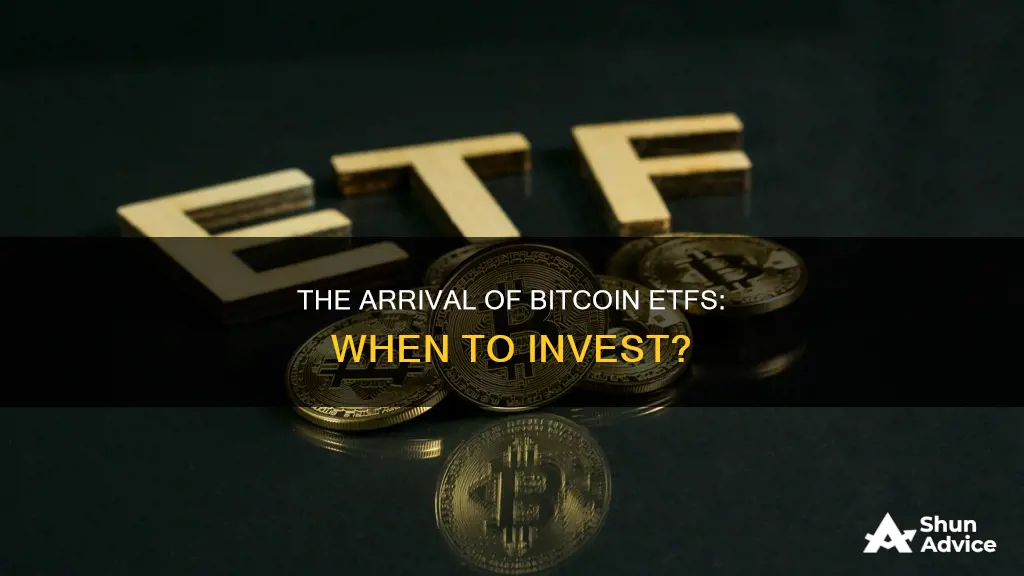
Bitcoin ETFs have been making headlines since the US Securities and Exchange Commission (SEC) gave the green light for their listing and trading in January 2024. This means that investors can now gain exposure to Bitcoin without directly owning it, as ETFs track the performance of an underlying asset.
A Bitcoin ETF, or exchange-traded fund, can directly hold Bitcoin and other securities, and unlike Bitcoin, can be traded by retail investors through regular brokerage accounts. This makes it easier for investors to mitigate risk, simplify the investing process, and increase overall portfolio diversification.
However, it's important to note that investing in cryptocurrencies like Bitcoin is still risky, and making Bitcoin accessible through an ETF won't eliminate its volatile nature.
| Characteristics | Values |
|---|---|
| Date of first approval of Bitcoin ETFs | 10 January 2024 |
| Number of Bitcoin ETFs approved | 11 |
| First official Bitcoin-linked ETF | Proshares Bitcoin Strategy ETF (BITO) |
| Date of first official Bitcoin-linked ETF | October 2021 |
| Number of Bitcoin ETFs that started trading on 11 January 2024 | 10 |
| Examples of Bitcoin ETFs | Grayscale Bitcoin Trust (GBTC); iShares Bitcoin Trust ETF (IBIT); Invesco Galaxy Bitcoin ETF (BTCO) |
| Examples of Bitcoin futures ETFs | ProShares Bitcoin Strategy ETF (BITO); Valkyrie Bitcoin and Ether Strategy ETF (BTF); VanEck Bitcoin Strategy ETF (XBTF) |
What You'll Learn

Bitcoin ETFs vs Bitcoin futures ETFs
Bitcoin ETFs and Bitcoin Futures ETFs are both exchange-traded funds that allow investors to gain exposure to Bitcoin's price movements without directly owning the cryptocurrency. However, there are some key differences between the two.
Bitcoin ETFs
Bitcoin ETFs are funds that invest directly in Bitcoin by purchasing and holding the cryptocurrency. These funds provide investors with a way to gain exposure to the day-to-day price movements of Bitcoin without having to worry about the security and storage of the underlying asset. The first Bitcoin ETFs were approved by the SEC in January 2024, and they have since become a popular way for investors to gain exposure to the cryptocurrency market.
Bitcoin Futures ETFs
Bitcoin Futures ETFs, on the other hand, do not hold Bitcoin directly. Instead, they invest in futures contracts that are based on the price of Bitcoin. These contracts allow investors to speculate on the future price of Bitcoin without actually owning it. The first Bitcoin Futures ETF, the ProShares Bitcoin Strategy ETF (BITO), was approved by the SEC in October 2021.
One of the main advantages of Bitcoin Futures ETFs is that they provide investors with a way to gain exposure to Bitcoin without the need to purchase and store the underlying asset. This can be particularly attractive to investors who are concerned about the security and storage of Bitcoin. Additionally, Bitcoin Futures ETFs can provide leverage, allowing investors to amplify their gains or losses.
However, one of the limitations of Bitcoin Futures ETFs is the tracking error. The performance of the ETF may not always match the actual price movement of the underlying Bitcoin futures due to management fees, transaction costs, or other logistical issues. Additionally, the use of futures contracts introduces complexity and heightened risk, as investors need to have a sound understanding of futures trading and the potential for leverage.
In summary, both Bitcoin ETFs and Bitcoin Futures ETFs offer investors a way to gain exposure to Bitcoin's price movements. Bitcoin ETFs hold Bitcoin directly, while Bitcoin Futures ETFs invest in futures contracts based on the price of Bitcoin. Each has its own advantages and limitations, and investors should carefully consider their own financial goals, risk tolerance, and investment strategies before deciding which option is best for them.
Elon Musk's Dogecoin Investment: How Much Money?
You may want to see also

How to invest in Bitcoin ETFs
Bitcoin exchange-traded funds (ETFs) are pools of Bitcoin-related assets offered on traditional exchanges by brokerages to be traded as ETFs. The aim is to give investors exposure to cryptocurrencies without needing to own them. Bitcoin ETFs use futures contracts to achieve this goal. Fund managers purchase these contracts and bundle them into a fund.
The Securities and Exchange Commission (SEC) gave the green light to the listing and trading of Bitcoin ETFs in January 2024, with several starting to trade immediately.
As opposed to buying cryptocurrency outright, opening a Bitcoin ETF is a relatively easy process. First, you need to open a brokerage account. Once you have done this, you can purchase Bitcoin ETFs in the same way you would purchase any other stock or ETF. Simply search for the ticker symbol in your brokerage interface, enter the number of shares you want, and click "buy".
It's important to remember that investing in Bitcoin ETFs is risky due to the volatile nature of cryptocurrencies. The price of Bitcoin has fluctuated wildly, and the market is susceptible to price manipulation and criminal activities. Additionally, there is regulatory uncertainty around cryptocurrencies, and changes in regulations can impact the legality, trading, and valuation of Bitcoin futures.
Bitcoin ETFs allow more people to invest in Bitcoin without the necessary expenses and security procedures of buying the cryptocurrency directly. They also eliminate the need to store and safeguard security keys.
- Grayscale Bitcoin Trust (GBTC)
- IShares Bitcoin Trust ETF (IBIT)
- Invesco Galaxy Bitcoin ETF (BTCO)
- Bitwise Bitcoin ETF (BITB)
- ProShares Bitcoin Strategy ETF (BITO)
- Volatility Shares 2x Bitcoin ETF (BITX)
- ProShares Short Bitcoin ETF (BITI)
Bitcoin's Future: Investing a Dollar Today Could Mean..
You may want to see also

Bitcoin ETFs and their impact on the cryptocurrency market
Bitcoin ETFs, or exchange-traded funds, are a type of investment fund that allows investors to gain exposure to Bitcoin and other cryptocurrencies without directly purchasing and storing the tokens themselves. Bitcoin ETFs have been gaining popularity in recent years as a more accessible way to invest in cryptocurrencies, and their impact on the cryptocurrency market has been significant.
How Bitcoin ETFs Work
Bitcoin ETFs work by investing in a portfolio of Bitcoin or other cryptocurrency-related assets, such as futures contracts or mining stocks. These ETFs are traded on traditional stock exchanges, and investors can hold them in their regular brokerage accounts, making them more accessible to those who may not be familiar with the complex or time-intensive world of digital wallets and crypto exchanges.
Advantages of Bitcoin ETFs
One of the main advantages of Bitcoin ETFs is that they provide investors with exposure to the cryptocurrency market without the need for direct ownership of the underlying assets. This helps to reduce the costs and complexities associated with buying, storing, and securing cryptocurrencies. Bitcoin ETFs also offer diversification benefits, as they often invest in a basket of different cryptocurrencies, and they can be traded during regular market hours, providing liquidity to investors.
Disadvantages of Bitcoin ETFs
However, there are also some disadvantages to investing in Bitcoin ETFs. One of the main concerns is the risk of tracking error, especially for ETFs that rely on futures contracts to track cryptocurrency prices. Additionally, Bitcoin ETFs typically have higher fees and expenses compared to other types of ETFs, and investors do not have direct ownership or control over the underlying cryptocurrencies. The volatile nature of the crypto market also means that Bitcoin ETFs are subject to significant price swings and higher levels of risk.
Impact on the Cryptocurrency Market
The approval and launch of Bitcoin ETFs have had a significant impact on the cryptocurrency market. For example, the approval of spot Bitcoin ETFs in early 2024 led to a surge in trading volume, with the first 11 funds having a combined $4.6 billion in trading volume on their first day of trading. This has also driven demand for Bitcoin and other cryptocurrencies, as more investors gain access to these assets through their brokerage accounts.
The launch of Bitcoin ETFs has also opened up new opportunities for investors to gain exposure to other cryptocurrencies, such as Ethereum. This has helped to drive interest and investment in the broader cryptocurrency market and has led to the development of new crypto-related financial products.
Overall, Bitcoin ETFs have had a positive impact on the cryptocurrency market by increasing accessibility, driving demand, and bringing new investors into the space. However, it is important to note that investing in Bitcoin ETFs comes with risks, and investors should carefully consider their investment goals and risk tolerance before allocating funds to these volatile assets.
Raymond: Avoid Bitcoin for a Stable Financial Future
You may want to see also

Bitcoin ETFs and their fees
Bitcoin ETFs have gained popularity as an alternative to direct investment in Bitcoin. ETFs, or exchange-traded funds, are investment funds that hold assets and issue securities as shares of the fund, which are traded on an exchange. This allows investors to gain exposure to Bitcoin without the need for direct ownership, reducing the security procedures and costs associated with holding cryptocurrency.
The fees associated with Bitcoin ETFs can vary and are an important consideration when choosing an ETF. These fees can include total annual fund operating expenses, management fees, administration fees, and compliance fees. Some ETFs may also offer discounted fees for a limited time to attract investors. It is essential to review the fund's prospectus or offering document to understand all associated fees.
- BlackRock iShares Bitcoin Trust (IBIT): 0.25% for the first 6 months or until it reaches $5 billion in assets, then 0.12%
- Grayscale Bitcoin Trust (GBTC): 1.5%
- Fidelity Wise Origin Bitcoin Trust (FBTC): 0.25% with fees waived until August 1, 2024
- Ark/21 Shares Bitcoin Trust (ARKB): 0.21% with fees waived for the first 6 months or until it reaches $1 billion in assets
- Bitwise Bitcoin ETF (BITB): 0.20% with fees waived for the first 6 months or until it reaches $1 billion in assets
- VanEck Bitcoin Trust (HODL): 0.20% with fees waived until March 31, 2025, or until it reaches $1.5 billion in assets
- Invesco Galaxy Bitcoin ETF (BTCO): 0.25% with fees waived for the first 6 months or until it reaches $5 billion in assets
It is worth noting that the fee structures of Bitcoin ETFs can change over time, and different ETFs may have unique fee structures. Additionally, there may be other costs associated with investing in Bitcoin ETFs, such as bid-ask spreads, custodian fees, and transaction costs.
When considering a Bitcoin ETF, it is important to evaluate your investment goals, risk tolerance, and time horizon. Bitcoin and cryptocurrencies are highly volatile and speculative, so investing in Bitcoin ETFs carries a high level of risk.
Bitcoin Investment: A Reliable Bet?
You may want to see also

Bitcoin ETFs and their custodianship risk
The launch of Bitcoin exchange-traded funds (ETFs) has opened up a new level of curiosity from investors, particularly those who already have brokerage accounts. ETFs enable investors to access exposure to an asset without having to hold that asset themselves.
Custodianship is a tightly controlled segment of the market, led by names such as Bank of New York Mellon, State Street, and JPMorgan. Custodians keep and manage client assets, and in the case of Bitcoin, security is a top priority.
Bitcoin ETFs have been designed to allow more people to invest in Bitcoin without the necessary expenses and hassles of buying them directly. They eliminate the need for security procedures and excessive funds while providing a familiar investment type.
However, there are risks to Bitcoin ETFs. Custodianship is one of the key risks, as it is a new, fast-moving, and effectively invisible currency. Custodians must balance the safety and accessibility of funds, as many digital assets are designed to incentivize active participation.
There are only a handful of cryptocurrency qualified custodians in the US, including Coinbase, BitGo, Fidelity, Anchorage Digital, and Gemini. The New York Department of Financial Services is the leading regulator.
The majority of Bitcoin ETF issuers have chosen Coinbase as their custodian, which is a concentration of risk. Even if Coinbase is the safest option, new cybersecurity standards are needed to make crypto custody truly safe.
David Schwed, COO of Halborn, a cybersecurity leader focused on blockchains, has expressed concern about the concentration of risk, the inherently high-risk nature of crypto custodianship, and the still-evolving nature of security best practices. Schwed believes that:
> "Qualified digital asset custodians should be subject to more oversight from regulators and more rigorous state and federal standards."
The approval of Bitcoin ETFs has undoubtedly been a catalyst for renewed interest in digital assets, but it should not be viewed as the seminal moment for this emerging asset class. To avoid the mistakes of the past and ensure stability, the right custodial infrastructure and protocols need to be in place.
Custodians hold the keys, both literally and figuratively, to digital asset adoption. With the expected increase in institutional capital flows, trusted custody is of paramount importance.
Elon Musk's Bitcoin Bet: Millions Invested
You may want to see also
Frequently asked questions
A Bitcoin ETF is an exchange-traded fund that can directly hold Bitcoin among other investable securities. ETFs are similar to mutual funds but are traded directly on a stock exchange like stock in a publicly traded company.
Investing in Bitcoin through an ETF is a simple, low-risk way to get exposure to the crypto market. ETFs are one of the most affordable ways to decrease volatility through portfolio diversification.
Like most regulated securities, you can invest in Bitcoin ETFs through online brokerages and investment platforms.







